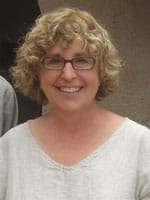Dr. Carol Parker shares how a trip to Tanzania inspired her to start a nonprofit to help transform the lives of children affected by HIV and AIDS.

Dr. Carol Parker
During her first visit to Tanzania in 2004 with Cross-Cultural Solutions, a nonprofit that combines travel with volunteer opportunities, Dr. Carol Parker ’09 visited hundreds of AIDS orphans who lacked food and access to education. On the plane home, “I realized I wasn’t done,” Parker says. “I couldn’t just walk away.”
The trip inspired her to found the Pamoja Project in 2005, a nonprofit based in Santa Fe, New Mexico, that partners with organizations in Tanzania to transform these children’s lives. Pamoja (which means “together” in Kiswahili) collaborates with WAMATA, an NGO in Tanzania, to offer a range of services for children and families affected by HIV and AIDS. To date, the organization has helped more than 200 AIDS orphans by providing school uniforms, supplies, and sponsorships; and 140 orphans have graduated from a tailoring training program with skills to support themselves.
Together, the organizations have also created 80 income-generation projects for mothers and caretakers of children living with HIV or AIDS and provided hundreds of microloans to help families work their way out of poverty. In partnership with Proctor & Gamble, Pamoja has provided the technology to produce 5.5 million liters of safe drinking water to date and educate residents about how to prevent waterborne disease. What’s more, the budget for programs has increased from $10,000 to $100,000.
When she began the Pamoja Project, Parker had a master’s degree in public health. “I knew a lot about health resource management but not much about HIV/AIDS or program development,” she says. Although she enrolled in the PhD in Public Health program, she intended only to take individual courses for professional development, but she was wowed by the skills she learned, which prompted her to complete the program. And after giving a poster presentation during a residency about caring for children living with HIV or AIDS in low-resource environments, several faculty members encouraged her to continue her research, which also spurred her on.
“I was finding the answers to questions I had about my work and was learning about topics and tools that benefited both me and the people with whom I was working,” she says. During a course about program design, Parker created and implemented a community health worker program in Tanzania. And her dissertation, The Lived Experience of HIV-Positive Tanzanian Orphans, provided the information she needed to receive grant funding to develop another program for Pamoja.
“At the beginning of my work, AIDS was still a death sentence, so much of the work was centered on end-of-life care, counseling, and outreach to AIDS orphans,” Parker says. “With the arrival of antiretroviral drugs, our work has changed. Now, we help people live with the disease. We teach them how to generate income and care for infected children in addition to providing psychosocial support and help for children to travel to clinics and receive better nutrition.”
Since she only travels to Tanzania twice a year for two to three weeks at a time, Parker continues to act as a conduit to generate financial support for needs identified by her collaborators at WAMATA. Her goal, however, “is not to create dependency upon our funding and guidance, but to give Tanzanians the tools they need to continue to take care of each other,” she says.
“The Tanzanians have a saying, ‘We are together.’ They are not waiting for outsiders to come and save them; they want to help themselves,” she continues. “It’s easy to be a passionate partner with people who are willing to work for shared goals.”
Tell us about your career by emailing [email protected].



